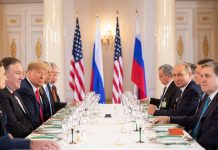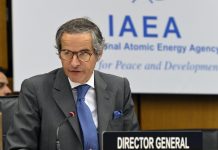We approach the end of 2025 on a very dangerous note. Regardless of a certain bravado among alternative media commentators and even by Putin himself one senses, for the moment, a relatively weak pushback from the Kremlin on the latest Trump-Zelenskiy-European aggressions against their common enemy-of-choice, the Russian Federation, whose wealth they so desperately seem to need – perhaps to buy a few more decades’ protection against the long-term ravages of climate change or, more simply, because these are countries led by vain, nasty, little people.
How is this weakness manifested? We have learned from Russia’s foreign minister Sergei Lavrov, that Putin reacted with some interest to a proposal carried to him in the summer by Steve Witkoff that Ukraine would retreat from the Donbass if Russia would halt at its front lines in Kherson and Zapporizhzhia. We don’t exactly know that Putin was really going to go that far (I don’t believe he was). But it was principally on the basis that he might consider doing so that Putin acceded to the Anchorage talks. This was without knowing, first, whether Washington was serious, but knowing, surely, as was quickly confirmed, that this would never be acceptable to Zelenskiy (because Zelenskiy’s personal security, and wealth, and that of his Banderite colleagues, depends on a continuation of the war or, rather, a continuation of the transfer of Western wealth to Kiev). And Putin surely knew, not simply that Russia is winning the war in Eastern Ukraine but was at that moment advancing on the cities of both Kherson and Zapporizhzhia.
Despite the failure of Anchorage, the Kremlin continued to play with the idea that some kind of long-term relationship with Washington, at the price of some sort of concession on Ukraine, was still desirable and possible, a dream that was smashed again when Washington first extended and then withdrew the concept of a summit meeting in Budapest. Instead of throwing up his hands in righteous despair, Putin sent his economic envoy Kirill Dmitriev to meet with his peers in Washington. Only they weren’t interested in seeing him. Putin’s slavering for a relationship with Washington betrays a totally dated hunger to be acceptable to the West and stinks, to be frank, of a prioritization of economic opportunities over political realities, one which is itself embedded in a dated fantasy about globalization.
NATO’s proxy war against Russia over Ukraine was a war not just of provocation by the West against Russia — a theme I have covered many times in this space — but a conflict that the West forced on Russia by denying its legitimate security interests through 1) the US positioning nuclear missiles in Poland and Romania, 2) the massive arming of the Armed Forces of Ukraine and construction of complex defenses along the Western Ukraine’s border with the self-declared independent republics of Donetsk and Luhansk, whose people Ukraine had been regularly shelling and killing ever since Ukraine lost the war against the Russian-supported republics in 2015, 3) the failure of the West to honor the terms of the Minsk agreements or to pressure Ukraine into so doing, and 4) the threatening build-up of Ukrainian forces early in 2022 against the republics to the point of threatening imminent invasion.
The motivation for the West’s provocation was helpfully spelled out in a 2019 report from a major think tank for the US military industrial complex, the RAND corporation, in its publication Extending Russia, close to the time of Zelenskiy’s accession to the Presidency that year. Zelenskiy promised peace with Russia but delivered a very sharp process of escalation that included demands for nuclear weapons. Some credentialed commentators have speculated, understandably, that Zelenskiy has all along been a creature of Ukrainian oligarchs, certainly true, and MI6.
The ensuring war of almost four years has incurred such unimaginable costs for Ukraine, in particular, the West generally and Russia too, that one must surmise that nobody ever really thought that this was only about Ukraine – about whether or not the independent republics should be allowed a measure of greater autonomy within Ukraine, something that Russia, Ukraine and Europe had already agreed via the Minsk accords. Of course, it was never just about this; at no stretch of the imagination can the staggeringly ugly cost have been considered worth such a small, administrative measure.
This is not the place to retrace the history of the past four years. Suffice to say, we have passed from the explicit and total hostility to Russia of the Neocon-driven and demented Biden administration through to what at first seemed a potentially friendly and in any case much more nuanced position of what is still a Neocon-driven and dangerously unstable Trump administration. As I have outlined above, we have gone through various phases of US openness to Russia, to US preference for Ukraine, to what is currently the naked face and unshakeable determination of the US to its fundamental goal which is the maintenance of US global hegemony (even when this is a matter of steps, shifts and phases).
Any analysis that does not retain in central place this overriding feature of all US foreign policy is fatally flawed.
We are living in a phase of post World War Two history in which the US and the West are collectively weaker than they have ever been. This is not least because of their incessant splurging of their people’s wealth in fighting this proxy war and, simultaneously, fighting along other major fronts in the battle for global supremacy. These fronts include support for Israel against Palestine and Iran, boosting Taiwanese secession from China, threatening regime change in Venezuela and Colombia on the totally misleading and hoary old deception of “drug war” nonsense, and the recapture of Latin America from China and its chaining to the US zone of imperial control (involving a bribe to Argentina of $40 billion, and a promise to Brazil to be kinder on tariffs). All this at a time when the West lacks the manufacturing and financial resources to sustain its regime changing, its wars and its pillaging, and at a time when Russia has considerably ramped up its capacity and its ability for weapons production, including a stream of deadly new advances in weaponry that include the hypersonic nuclear-capable kinzhal missile, its naval-based hypersonic nuclear-capable Zircon, the non-nuclear but nuclear-comparable Oreshnik, the nuclear fired and nuclear capable Burevestnik whose range is almost unlimited, and the Poseidon nuclear-capable super torpedo. Trump’s response is to threaten the reintroduction of nuclear testing, an international crime that violates the 1962 Test Ban treaty and destroys the final remnants of security against runaway nuclear competition.
Be that as it may, I think that complacency on behalf of Russia is badly misjudged. So far as the intensifying sanctions on Rosneft and Lukoil are concerned, these may not matter much in themselves. The sanctions specify trade via US financial institutions, and Russia’s trade with China and Russia does not, so far as I am aware, pass through US financial institutions. But they do add up to persistent pressure, through secondary sanctions and tariffs, on India, in particular, and on some other members of the BRICS.
China doesn’t care: it doesn’t need sales revenue from the US, and it can wield the big stick of prohibition on sales of rare earths to the US to extremely punitive effect. Perhaps this will allow for a new trade agreement between the US and China but frankly, if China is not now investing its entire energy into forcing the US into acceptance of a new multimodal world it is wasting its own time and everyone else’s.
For the time being China will continue to take around half of Russian energy exports, mostly by pipeline, and up to a half of Iran’s as well, which of course is part of the calculus of US-Israeli aggression on Iran. Russian State dependence on oil imports is around 25%. A few days ago (October 23) Reuters reported that China was suspending its purchases of oil from Russia’s two major suppliers, but I am not inclined to take this too seriously: it may be a measure that China has taken with a view to avoiding any unnecessary rocking of the boat in advance of trade talks on October 30 between Trump and Xi. I think it very unlikely that China will want to be seen to succumb to unreasonable US pressures or that it would want to significantly damage its relationship to Russia.
India will very likely maintain its imports of Russian oil, but not to the same degree as it did. Yes, we should assume that India and Russia in partnership with other nations will find plenty of workarounds. But India, which takes most of its Russian oil by ship,will both want to assert its independence from the US and at the same to reduce the damage to it of more extensive US tariffs by increasing its imports of US LNG. This could ultimately lead to a reduction in oil revenue to the Russian Treasury by, say, a third, or 17% of the total.
Bear in mind also that the Europeans seem set on reducing still further their imports of Russian oil and gas from 13% of their total supply to zero (and will likely face down opposition to this policy from Hungary and Slovakia which depend on Russian energy more than the rest of the Union).
At the same time, Europe is applying its 19th sanctions package on Russia, and continues to move towards seizure of Russian assets (assuming these have not already been used for collateral, as many have assumed for a year now). If so, and it seems likely, then this may prolong the war by three years or more. If Russia chooses to respond to that simply by continuing its current campaign of attritional war, then, yes, we may still end up with the end of the entirety of Ukraine or Ukraine being sliced up between Russia, Poland, Romania and Hungary, with Germany taking a slice of Poland as part of the overall deal (based on ancient and not-so-ancient revanchist claims).
If Russia chooses to respond to that simply by continuing its current campaign of attritional war, then, yes, we may still end up with the end of the entirety of Ukraine or, given what we should expect to be Russian caution in taking responsibility for Western Ukraine beyond Odessa and Kiev, being sliced up between a rump Ukrainian regime, Poland, Romania and Hungary, with Germany taking a slice of Poland as part of the overall deal (based on ancient and not-so-ancient revanchist claims).
Even though the demise of his country seems a plausible outcome, the great paradox is that Zelenskiy needs escalation – more war – because that is the only way, in his eyes, that he can secure continuing European and US involvement and he is, in any case, likely to be a Western intelligence asset serving Western not Ukrainian agendas.
Extending the war will also be very expensive for Russia in terms of wealth and of lives. It will give time for NATO to re-arm so that the war can be pursued over an even longer period, although Russia will certainly have re-armed at an equivalent or faster pace from a stronger baseline and with the advantage of having in its possession, now, weapons that could settle the conflict in its favor right away.
So the current escalation provides a strong motivation for a very hard pushback on the West by Russia, a motivation that so far has not seemed as strong a driver on Putin’s thinking as it has on that of some of his colleagues.
Strengthening this motivation are all kinds of noises about Europe making life difficult for Russian tankers or Russian “shadow fleet” boats in the Baltic and a loosening of the rules of air engagement that has been prompted by fictitious or false flag operations in Poland, Romania or Latvia and the like. And whether or not Trump sends Tomahawk missiles, it is certain that Britain has resumed the supply of Storm Shadow missiles (which require US approval of their use) for the purpose of “Ukrainian” strikes on Russian energy and other facilities. Where there are Tomahawks or Storm Shadows, German Taurus cannot be far behind.
Russia is well able to respond in devastating kind, but so far it has chosen not to do so. By that, I mean it has refrained from a decapitation strike on Kiev. It has refrained from taking out European or NATO elements in Odessa and marching on the city to take it once and for all. It has refrained from firing non-nuclear oreshniks and nuclear zinzhals and the like on Brussels, London, Paris and Berlin even though we are told by Russia that NATO members including Britain have had a part to play in the striking of Russian nuclear infrastructure and in other reckless gambits.
Russia also seems to believe that it has a faithful ally in China, first and foremost, and across the Global South, including in North Korea. And this is likely a dependable truth because sooner or later, if Russia succumbs, China is next in NATO’s sights and China must know, or does it really?) that trust in Trump, trust in the US, is absolute lunacy.
For the time being, in a context of overall restraint, it is nonetheless true that NATO/Ukrainian drone and missile strikes are bringing the war home to ordinary citizens across Russia (even if this is less evident in Moscow than in Saint Petersburg and elsewhere) in the form of falling debris from targeted drones, airport shutdowns, refinery fires, interrupted Internet communications. These inconveniences contribute to a sharpening criticism of Putin’s commitment to sobriety and sanity which many Russians now regard as dangerously weak.
Yes, of course, the US-Ukraine-Europe bombast is theatrical to a significant degree. The UK, France and Germany each has economic problems that may yet turn out to be crippling. But it is precisely such problems that help keep the Europeans hungrering for some kind of a magical solution that will return them to their imperial glory days. Indeed, what is the European Union other than a collection of zombie empires whose elites, propped up for the most part by finance capital, would like to be resuscitated?
The current impasse is largely the product of competing bluster and some of us have been inclined to see the greatest share of this bluster emanating from NATO. Now we wonder more about Putin’s restraint – not so much because it is the equivalent to a coil that is about to spring, but because there are elements to the calculus of this conflict about which the Kremlin is not leveling or because, for Russia’s new capitalist class, the struggle just isn’t worth the risk of nuclear annihilation and the end of their privileged status.
Others might argue that the war is one of NATO’s and Europe’s choosing, through provocation, and that in the OK Corral it has to be NATO that holsters its pistols, and that it is Russia’s historic mission to eyeball its opponents out of the game at the gateway to a multipolar or multicentric order.
In summary, the West is at its weakest point since the end of World War Two. But the West is driven by an ideology of US domination even though the mechanisms of domination are cranky and rusty, and its operators, when push comes to shove, will quickly demonstrate a cluelessness that is so well captured in Kathryn Bigelow’s latest movie, A House of Dynamite. This dangerous illusion also clouds the minds of leaders in Russia and in China dampening their intellectual courage when it comes to seizing the unique advantages of this moment in history.
(Featured Image: “Vladimir Putin with President of the United States of America Donald Trump after a joint news conference” by Kremlin.ru is licensed under CC BY 4.0.)





